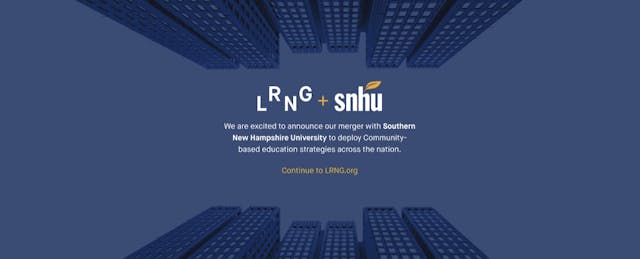Southern New Hampshire University (SNHU) and nonprofit LRNG have agreed to merge into one behemoth education organization with an ambitious goal: to streamline the disjointed pathways between K-12, higher education and the workforce and create something altogether more cohesive.
“We think this will be the first real opportunity to build out fully robust pathways for young people into college and career, where the pathways begin with badges [from LRNG] and end with college credit [from SNHU],” predicts Connie Yowell, CEO of LRNG.
SNHU is a private, majority-online university that serves both traditional and adult learners. LRNG is a nonprofit that lets students earn badges through partnerships with businesses and community organizations. The two—which collectively serve about 180,000 learners—want to create a model that is customizable enough to help a high school student get a jumpstart on their associate degree and a 55-year-old professional learn a new skill.
The model they envision will be implemented at the local level, says Paul LeBlanc, president of SNHU.
“Cities feel like the right level of granularity for us,” LeBlanc tells EdSurge. “You can go into a city and try to understand their particular workforce needs—more so than at the state level.”
Southern New Hampshire has some experience working in cities, but not to the extent LRNG has. Born in 2015 out of a project funded by the MacArthur Foundation, LRNG has reached 55,000 students in 19 cities with its digital badges and community-focused employment programs.
Its 20th city, Birmingham, Ala., will be a brand new venture for both groups, LeBlanc says. Birmingham will be ground zero for their learning and workforce model. There, the organizations plan to supplement their online platforms with a physical “mini-campus.”
“Think about it as a WeWork for education,” he suggests, referring to the technology startup that provides shared workspaces for professionals. “It’ll be a multipurpose space that offers a place for young people to come do work.” The space will provide learners access to technology, academic advising, tutoring and college counseling. If they need somewhere to hold a meeting, interview for a job or just hunker down and get some work done, the space will be available to them.
The details haven’t been worked out yet, he says, but the site will likely be at an existing education space—a library, a school or a community college.
When they’re not convening at the physical location (and even when they are), students can go online to work on one of LRNG’s thematic sequences, called “learning playlists,” and eventually earn digital badges in computer science, design, communication, financial literacy or another subject.
Currently SNHU and LRNG are looking at how these digital badges can be applied toward an SNHU degree. The idea is that playlists will lead to badges, badges will lead to college credit, and college credit will eventually lead to a degree or another credential. By offering all this in one place, the two organizations are, in theory, creating a natural, seamless progression in learning that doesn’t stop at the end of a grade level or at the transition from K-12 to postsecondary education.
Today, badges don’t count as credit. Instead, they come with other incentives. For example, LeBlanc says, completion of a workforce readiness sequence unlocks a job interview at Gap, the clothing retailer and an LRNG partner. And completion of a financial literacy series unlocks the first paycheck associated with a concurrent job.
“We’re really trying to shorten the gap between what students are learning and its relevance in the world,” LRNG’s Yowell says of the digital badges. “We think that will have a huge impact on people’s motivation for learning and their engagement in learning.”
LRNG and Southern New Hampshire are also looking for the next cities to test their model. In the next month, LeBlanc says, they expect to announce two more “major” cities that have signed on.
In addition to reaching a new population of students—as young as middle school—he says the partnership is about making SNHU sharper and more innovative.
“I think over the next five years we’ll learn a lot from LRNG,” he says. “We’ll learn about low-income youth and how to serve them better. We’ll take from [LRNG’s] youth-informed, youth-inspired design approach.”
LeBlanc says the merger was a “no brainer” because the two groups already do such complementary work. The SNHU team that has been working in U.S. cities will now join LRNG as the “community impact arm” of the university, he says.
For LRNG, one of the biggest attractions to joining Southern New Hampshire is the opportunity to scale.
“We hope to reach hundreds of thousands of students” through the partnership, Yowell says. “In a couple years, we’ll be ready for exponential growth.”


